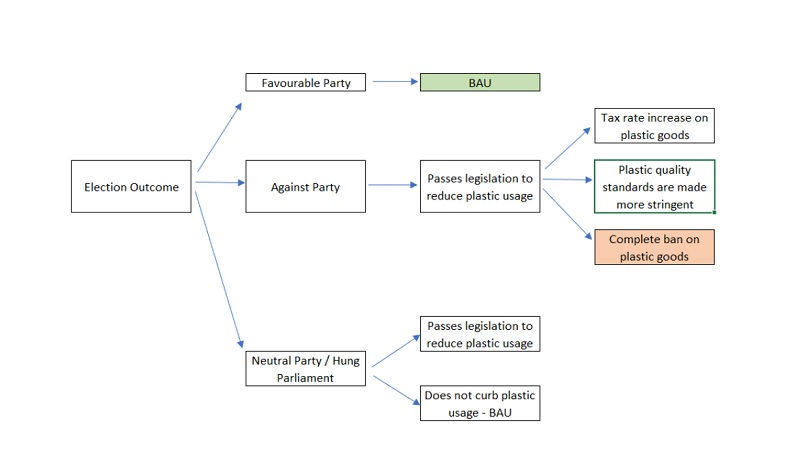2020 was a year of major disruptions for the business world. But whether your organisation suffered or...
 Modern-day business environments are complex, dynamic and highly dependent on many external factors, ranging from technological advances to trade wars between economic superpowers. And then, there is the rare black swan event that disrupts the entire world order. Today, the COVID-19 pandemic has brought the global economic machine to a grinding halt and threatens to contract the world economy during these years.
Modern-day business environments are complex, dynamic and highly dependent on many external factors, ranging from technological advances to trade wars between economic superpowers. And then, there is the rare black swan event that disrupts the entire world order. Today, the COVID-19 pandemic has brought the global economic machine to a grinding halt and threatens to contract the world economy during these years.
At times like these, the irrelevance of elaborate long-term planning is reinforced, and the need for short-term, dynamic Scenario-Based Planning becomes evident. However, many organisations remain stuck in the traditional planning process, which takes months to prepare and becomes outdated the moment they are finalised. While humans physically progress into a rapidly-changed world, our minds do not adapt as fast to uncertainty. We prefer to operate with an incorrect map than with no map, which psychologists call availability bias.
In such a context, it is the responsibility of the FP&A team to guide business leaders towards making informed decisions that ensure optimal performance during these difficult times. In doing so, we must harness the power of scenario-based planning. Below are the critical factors and steps in this process.
1. Identify the Key Business Drivers and Critical Uncertainties
Businesses are affected by a myriad of internal and external factors, for example, competitor actions, technological changes, tax and interest rates and natural calamities. However, a handful of key factors influence an organisation’s results more than most. The first step is to identify these. For instance, for a plastic product manufacturer, the most critical external factors may be oil prices, government regulations and research and development (R&D) work that focuses on plastic alternatives.
The next step is to identify the factors that hold the most uncertainty. For example, in an election year where a prominent political party proposes strict measures for plastic reduction, the election's outcome becomes a significant driving factor to the business. It is a factor that holds high critical uncertainty for the business and can impact results significantly.
2. Generate Multiple Scenarios through Decision Tree Thinking
Due to the uncertainties around key business drivers, multiple outcomes scenarios need to be built. Decision tree thinking can be used to bring structure to this since it ensures a mutually exclusive collectively exhaustive (MECE) framework. A decision tree has been illustrated below in a continuation of our plastic manufacturer example. The best-case scenario for the manufacturer would be “business as usual (BAU)”, and the worst case would be a complete ban on plastic goods.

Figure 1: An Example of Decision Tree
3. Be Mindful of Possible Cognitive Errors and Be Receptive to the External Environment
Our minds are susceptible to multiple cognitive errors. The desire for a specific outcome or discomfort with uncertainty can make leaders prone to resisting Scenario Planning. While thinking in an uncertain environment, our minds are likely to disregard negative outcomes with a low probability and overestimate the likelihood of the best-case scenario. Organisations may become overconfident and fail to prepare themselves for unfavourable outcomes. When Nokia famously ignored the potential of Android’s scalability, they overestimated the value of their brand and the probability of their success without Android. They also neglected the probability that other cell phone manufacturers would use Android to scale rapidly. This led to Nokia’s downfall.
FP&A teams must play devil’s advocate and challenge the assumptions of business leaders instead of simply creating ‘ideal’ scenarios on spreadsheets. Just because a particular outcome has not occurred in the past does not mean it will not happen in the future. Being aware and receptive to the external environment is essential to bring all possible scenarios to the table.
4. Harness the Technological Tools Available to Enable Real-Time Planning Solutions
While all the above factors are valuable for better planning and decision-making, capturing every potential outcome driven by each combination of critical factors is practically impossible. The reality is that circumstances will change rapidly, requiring an ability to update plans in real-time. In the past, FP&A would build 3 scenarios: the base case, the best case and the worst case. Any significant change in circumstance or a request from a senior executive that required a new scenario would trigger all-nighters by the FP&A team and a significant amount of time to calculate and present.
Today, FP&A teams can quickly build and iterate infinite scenarios by harnessing the available technology and tools. This enables real-time plans to be discussed, which drives more informed decisions.
For instance, in the current cloud of COVID-19 uncertainty, many sudden decisions are being taken by governments, including lockdowns, visa extensions and flight cancellations. In addition, projections on the pandemic’s timeline are effective scenarios that illustrate extreme variety in their results since there is no definite cure for the virus. No finite number of plans can cover all the possibilities in such circumstances. As a result, it would serve businesses well to have a dynamic planning process ready to adapt to quick changes.
Conclusion
Overall, the COVID-19 crisis offers FP&A teams and businesses worldwide an opportunity to refine their Scenario-Based Planning processes to help them steer through this tunnel and emerge stronger at the end.
This article was first published in Unit4/Prevero.
Subscribe to
FP&A Trends Digest

We will regularly update you on the latest trends and developments in FP&A. Take the opportunity to have articles written by finance thought leaders delivered directly to your inbox; watch compelling webinars; connect with like-minded professionals; and become a part of our global community.





